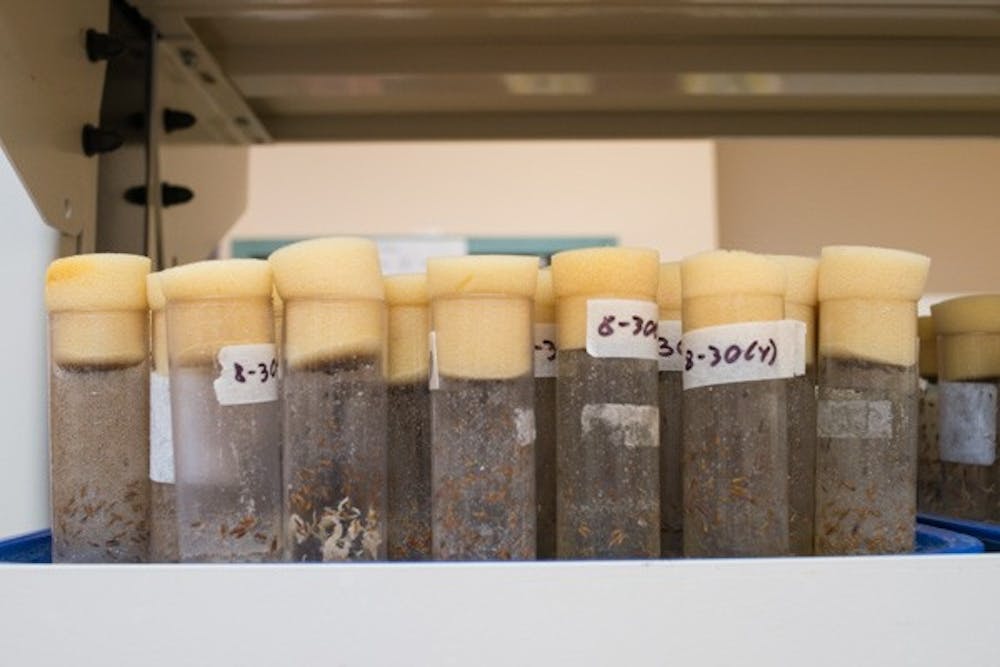As Halloween quickly approaches, images of ghosts, ghouls, webs and creepy arachnids begin to decorate hallways and stores. However, the presence of black widows on the West campus is not exclusive to this festive season.
The behavior of black widow spiders has been the focus of many studies in the Animal Ecology Lab over the course of the last decade.
Professor Chad Johnson teaches animal behavior, which is the lab's focus. For the past decade, he and his students have looked at the black widow and studied its ecology, behavior and emotion.
Researchers want to look at why certain pests are able to survive in urban settings so well, and Johnson said black widows are very practical for this type of research.
“They were picked to be studied, because they do really well around humans, and they grow in higher numbers and thrive in urban settings,” he said.
 Small flies in containers that are used to feed baby spiders and smaller spiders. (Photo by Andrew Ybanez)
Small flies in containers that are used to feed baby spiders and smaller spiders. (Photo by Andrew Ybanez)The most recent study the lab has been working on is looking at ballooning, the process by which baby spiders disperse.
“We wanted to study this ballooning for a while, but never knew how to do it," Johnson said. "So we set up a team to develop a way to study it. So hopefully in the next couple months we’ll be able to tell the community what helps disperse the widows in the city more or less rapidly.”
Life sciences senior Dale Stevens has been working on the project with Johnson but also does his own research in the lab.
“Since I was in high school, animal behavior has interested me more than other classes,” he said, “I did a project with the Mediterranean house gecko. I’m also working on a project to see how temperature on a female black widow effects its offspring.”
Life sciences senior Annika Vannan also does research in the lab, and recalls how she first got involved.
“I started hearing some really interesting rumors, first from a former member of the lab who said how cool it was," she said. "Then I heard from some people who were not a part of the lab that there just spiders crawling around everywhere and it freaked me out. I had to hear more about it. The rumors were wrong; we don't have spiders crawling around.”
In addition to her work on the group ballooning project, Vannan also does research with crickets.
 A variety of different spiders on the shelves at the Animal Ecology Lab on the ASU West campus. (Photo by Andrew Ybanez)
A variety of different spiders on the shelves at the Animal Ecology Lab on the ASU West campus. (Photo by Andrew Ybanez)“I've probably worked with hundreds of widows and too many crickets, because I research them, and we use them to feed the black widows,” she said.
Johnson said he is proud of the lab's student research.
“The point here to make is that these students here are doing their own research," he said. "They could just be washing petri dishes for me, but they're not. They’re conducting their own research. They can study black widows, and it may be easier since we already are doing that, but they can also study other things."
Despite the reputation that comes with these household pests, the studies have been very safe, Johnson said.
“The widows are not an issue," Johnson said. "Down the hall we have people studying chemicals that are much more dangerous than these widows. The students who work in this lab are well-trained."
Reach the reporter at rtashboo@asu.edu or follow her on twitter at @Rachael_Ta
Like The State Press on Facebook and follow @statepress on Twitter.





